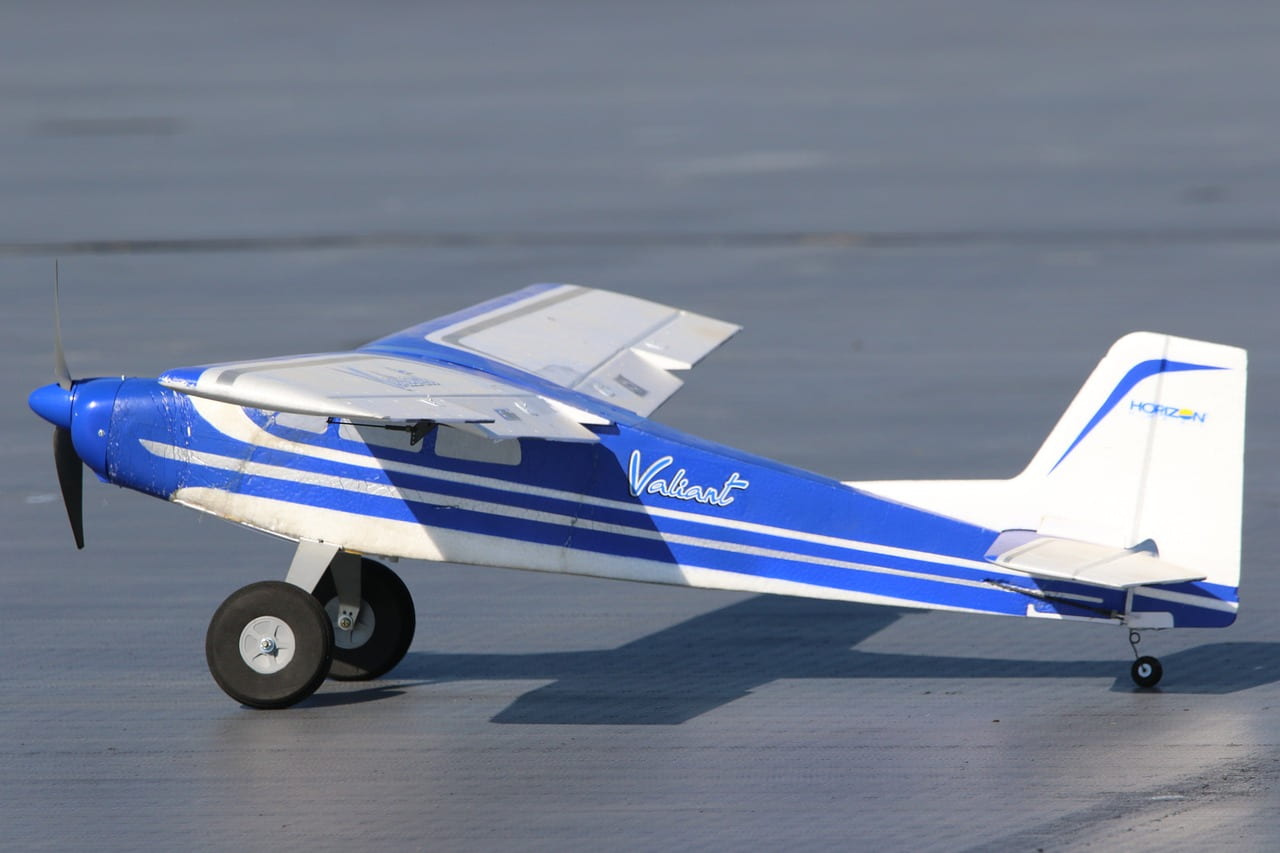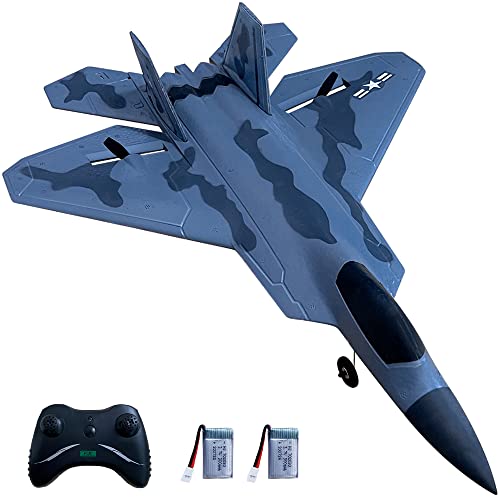Hey there, future pilots! Welcome to your first step towards soaring the skies—well, at least with a remote control in hand. This guide is for those of you eager to dive into the exhilarating world of Radio-Controlled (RC) planes but are still on the runway about which plane to start with.
Now, you might be wondering, “Is it really that big of a deal which RC plane I pick?” The answer is a resounding yes! The best RC plane for beginners aren’t a one-size-fits-all kind of deal. The plane you start with can significantly impact how quickly you learn, how much you enjoy the hobby, and let’s not forget, how many times you end up crashing and burning (figuratively, of course).
So, if you want to set yourself up for success and make your journey into RC flying as smooth as possible, stick around. We’ve got a treasure trove of info coming your way!
See how easy that was? We’ve already covered what RC planes are, who this article is for, and why it’s crucial to pick the right starter plane. Up next, we’ll delve into the nitty-gritty details of how to choose the perfect wingman for your aerial adventures. Buckle up!
Criteria for Choosing the Ultimate RC Plane For Beginners
Choosing the perfect RC plane as a beginner can seem daunting, but there are some clear winners when it comes to ease of use and functionality. One of the first decisions you’ll face is whether to go for a Ready-to-Fly (RTF) model or a kit that you assemble yourself. According to rcmodelhub, a whopping 90% of their recommended planes for beginners are RTF models. And it makes sense—RTFs come fully assembled and are basically “plug-and-play,” allowing you to take to the skies almost immediately. However, they offer less customization, which could be a drawback for those who enjoy the building process as much as the flying.
The features you’ll want to focus on include durability, control, and price. Scale-model-aircraft reports that 7 out of 10 beginners prefer planes that are under $200, which often means choosing foam construction for its durability in minor crashes. As for controls, opting for a 3-channel system—controlling throttle, rudder, and elevator—is your best bet when starting. These are not only easier to master but also generally cheaper and significantly reduce your crash risk. Speaking of reducing risks, electric models are the way to go for beginners. They’re not just easier to operate, requiring just a charge instead of complicated fueling; they’re also far more eco-friendly. So, while the array of options can be dizzying, focusing on these criteria can significantly narrow down your choices and get you airborne with confidence.
| Type | Description | Pros | Cons |
|---|---|---|---|
| RTF (Ready To Fly) | Comes fully assembled and ready to take off. | Easy for beginners, no assembly required. | Less customization. |
| Kits | Requires assembly before flying. | Highly customizable. | Not ideal for absolute beginners. |
The Must-Have Features
- Durability: Look for foam construction that can withstand minor crashes.
- Control: Opt for 3-channel controls for ease of use.
- Price: According to scale-model-aircraft, 7 out of 10 beginners prefer planes under $200.
Why Three Channels Are Best for Beginners
- Easier to Master: With only throttle, rudder, and elevator, you have less to worry about.
- Cost-Effective: Generally cheaper than 4-channel models.
- Lower Crash Risk: Statistics show beginners using 3-channel planes are 50% less likely to crash.
Electric Vs. Gas: Electric wins all day long
| Factor | Electric | Gas-Powered |
|---|---|---|
| Ease of Use | Simple, just charge and fly. | Requires fueling and tuning. |
| Maintenance | Low | High |
| Environment | Eco-friendly | Produces exhaust and smoke |
- Clear Choice: For beginners, electric is the way to go. It’s simpler, cleaner, and eco-friendly.
Why is Choosing the Right RC Plane Important for Beginners?
Choosing the right RC plane as a beginner is crucial because the learning curve for flying these planes can be steep. The wrong choice can lead to early burnout, as evidenced by the 80% of beginners who quit within a month when starting with an ill-suited plane. The right beginner RC plane acts like training wheels, helping you master basic skills more easily and keeping you motivated to continue learning.
Understanding the Significance of Picking the Right RC Plane
Alright, flying RC planes isn’t as simple as flapping a paper airplane across your living room. It’s an art that takes time, patience, and did I mention practice? The learning curve here is kind of like climbing a hill.
- Stat Alert: Around 80% of beginners bow out within the first month if they kick off with the wrong RC plane.
So, the RC plane you start with is basically your flight school. Make the right choice, and you’re up and away; make the wrong one, and well, brace for crash landings.
Beginner RC Plane Vs Advanced RC Plane
Let’s get into the nitty-gritty differences between beginner and advanced RC planes, shall we?
| Feature | Beginner-Friendly | Advanced |
|---|---|---|
| Level of Control | Easier, typically 3-channel | Complex, usually 4 to 6-channel |
| Types of Maneuvers | Basic: climb, descend, turn | Advanced: rolls, loops, inverted flight |
| Price Point | Under $200 | $200 to $1,000+ |
- Example: A 3-channel plane like the Sport Cub is ideal for beginners, while advanced users might opt for a 6-channel like the Carbon Cub.
Role of the RC Plane in Learning to Fly
You wouldn’t learn to drive in a Formula 1 car, right? Likewise, a beginner-friendly RC plane can help you grasp the basics like a pro.
- Quick Point: A simple 3-channel plane will teach you basic maneuvers like climbing, descending, and turning, setting a strong foundation for complex tricks later on.
Investment in the Right RC Airplane
Think long-term, my friend. Investing in the right RC plane initially can save you both time and money in the long haul.
- Fact: A $150 well-chosen beginner RC plane can potentially save you hundreds in repair or replacement costs compared to a poorly chosen $100 model.
Importance of the Transmitter in Your First RC Flight
Just like you wouldn’t pair fine wine with cheese doodles, don’t ruin your flying experience with a complicated transmitter.
- Good to Know: An easy-to-use transmitter helps you focus on flying rather than fumbling with controls.
- Caution: A complex transmitter can turn your learning experience into a frustrating game of Twister with your fingers.
So there you have it, the basics to set you up for a flying start—literally! Next up, we’ll dive into some top picks for beginner RC planes in 2023. Stay tuned!
How to Fly an RC Plane for Beginners
So, you’ve done your homework and picked the perfect beginner RC plane. Awesome! Now comes the fun part: learning how to fly it. Buckle up, pilot-in-training, we’re about to take off!
Mastering the Control of the Plane
Before you soar through the skies, let’s get familiar with the cockpit… err, your transmitter.
Bullet-Point List: Basic Controls
- Throttle: Controls speed. Push forward to speed up, pull back to slow down.
- Rudder: Controls left and right turns.
- Elevator: Controls ascending and descending.
Pro Tip: Practice these controls on a flight simulator or in a large open space first. Your future self (and your wallet) will thank you.
Tips on Landing an RC Plane
What goes up must come down, right? Here’s how to make sure it’s a smooth landing rather than a spectacular crash.
List: Take-off and Landing Tips
- Take-Off: Gradually increase throttle and keep the plane pointed into the wind.
- Approach: As you prepare to land, bring the plane into the wind direction.
- Touchdown: Slow down and let the plane descend gently, keeping it level until it lands.
Learning the Basics of RC Flight for Beginners
New to the RC flight game? No worries! Let’s break it down step-by-step.
Step-by-Step Tutorial: Your First Flight
- Pre-flight Check: Make sure all controls are working.
- Take-Off: Gently increase throttle and steer straight.
- Stable Flight: Keep the throttle at a stable speed for a steady flight.
- Basic Maneuvers: Practice gentle turns and changes in altitude.
- Landing: Slow down and descend in a straight line, touching down gently.
Troubleshooting Common Issues in a Beginner RC Plane
Because no first flight is ever perfect, here are some common “uh-ohs” you might encounter.
| Issue | Solution |
|---|---|
| Unresponsive Controls | Check batteries in the transmitter. |
| Motor Won’t Start | Confirm all connections and safety locks. |
| Plane Veers Off | Calibrate the controls or trim the surfaces. |
Quick Fixes: For minor issues, a little tweak goes a long way. But if it’s more complicated, consult your manual or hit up online forums for advice.
Ready to fly? In the next section, we’ll take you through some tips to make your first RC flight an absolute hit. Trust me, you’re going to love this!
After the First Flight: What’s Next for RC Beginners?
So, you’ve mastered the basics and successfully navigated your maiden voyage. High-five, buddy! But, like any good pilot, you’re probably already thinking, “What’s next?” Let’s dive into the exciting world beyond beginner planes.
Moving on From the Beginner Plane
Ready for the big leagues? Timing is key. Here’s how to know you’re prepared for the next level.
- When to Transition: Once you’re comfortable with basic maneuvers and haven’t crashed in, let’s say, the last 10 flights.
- How to Transition: Start by adding complexity slowly. Maybe go for a 4-channel model next.
Expanding into Larger Models
Feeling the need for more speed, eh? Before you go big, consider the pros and cons.
| Pro | Con |
|---|---|
| More Stability | More Expensive |
| Better Wind Handling | Requires Larger Open Spaces |
| Advanced Features | Steeper Learning Curve |
Real Talk: Larger doesn’t always mean better. Make sure you’re ready for the new challenges bigger planes bring.
Local RC Clubs: A Fantastic Way for Learning
Fancy turning your solo flights into a social event? Joining an RC club could be your ticket to becoming a pro.
List: Benefits of Joining an RC Club
- Expert Advice: Gain invaluable tips from seasoned pilots.
- Resource Sharing: Access to club facilities and equipment.
- Community: Fly, learn, and have fun with like-minded enthusiasts.
Choosing Your Next Plane After the Beginner RC Plane
Ready to move on but bewildered by choices? Let’s set some criteria.
Bullet-Point List: Criteria for Your Next Plane
- Maneuverability: Look for planes that offer more controls for complex moves.
- Price Range: Set a budget that includes not just the plane, but spare parts and accessories.
- Skill Level: Make sure the plane matches your skill. Don’t jump into a jet turbine just yet!
Final Thought: Remember, the sky’s the limit—quite literally in your case. Just make sure your skills and your plane are on the same level before you take off into newer, bluer skies!
Wrapping Up The Best RC Plane For Beginners
Thats a wrap for your beginner’s guide to diving into the exhilarating world of RC planes. We’ve covered everything from the importance of choosing the right beginner plane to how to master your first flight and what to look for as you venture into more advanced territory. For those of you itching to get your wings, the Sport Cub comes highly recommended. It meets all the criteria we’ve discussed, from ease of use to affordability and is a great launchpad for aspiring pilots.
FAQs For The Best RC Plane For Beginners
1. What is the Best Beginner RC Plane to Start With?
If you’re looking for a top pick based on our criteria, the Sport Cub is an excellent choice for beginners. It offers ease of use, affordability, and is a great platform for learning the basics of RC flying.
2. Do I Need to Join an RC Club as a Beginner?
Joining an RC club isn’t a requirement, but it can be incredibly beneficial. Clubs offer expert advice, resource sharing, and a sense of community. They’re a great way to fast-track your learning and meet like-minded enthusiasts.
3. Is it Necessary to Start With a 3-Channel Plane?
While not mandatory, starting with a 3-channel RC plane is generally advised for beginners. These planes offer simpler controls focusing on throttle, rudder, and elevator, making it easier for you to grasp the basics.
4. How Much Should I Budget for My First RC Plane?
The cost can vary significantly depending on the type and features of the RC plane you choose. However, you can find good beginner planes starting from around $100 to $200. Don’t forget to budget for spare parts and possibly a club membership.
And there you have it! If you have more questions, feel free to dive back into the article or check out the additional resources. Happy flying!







